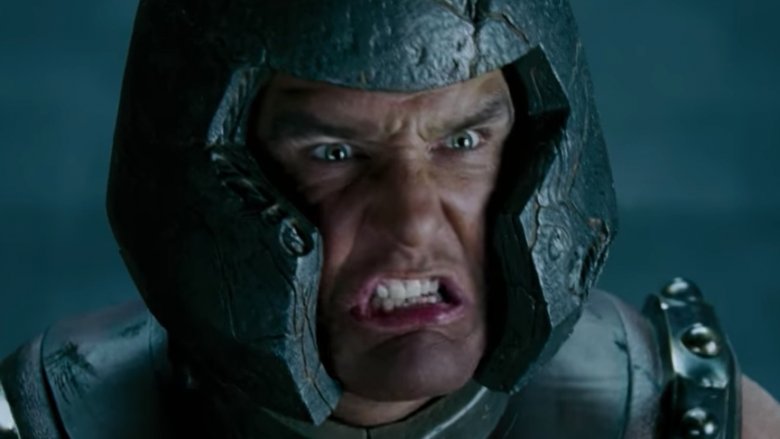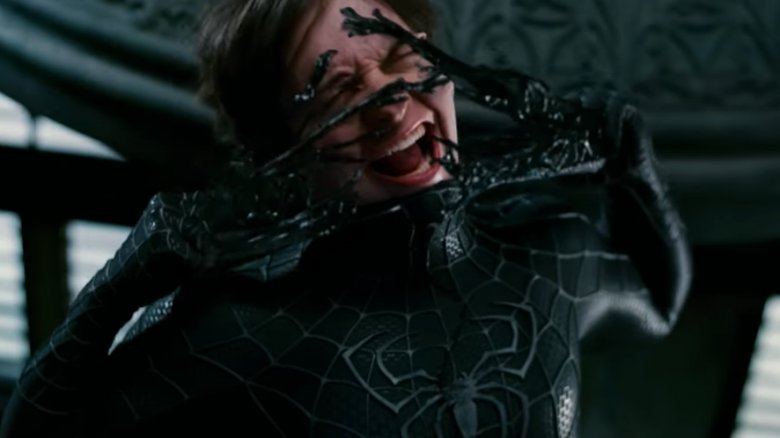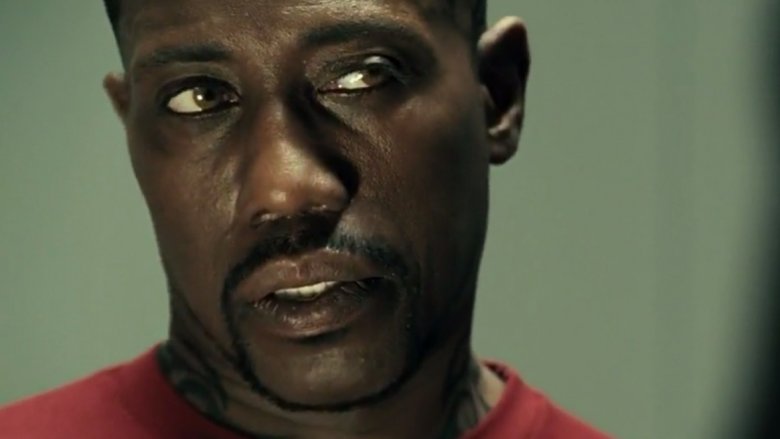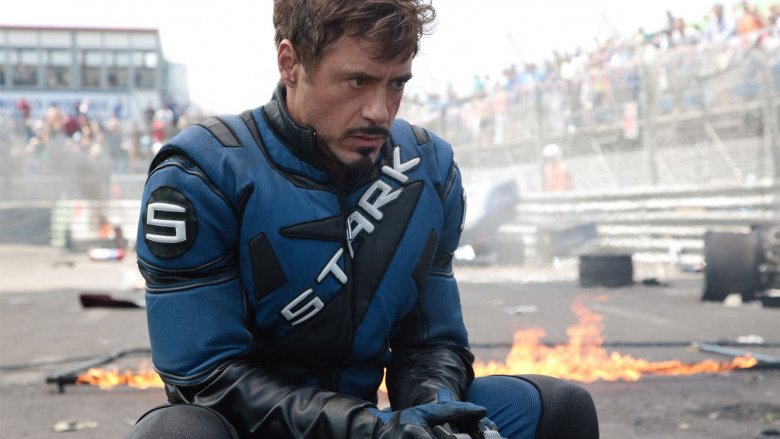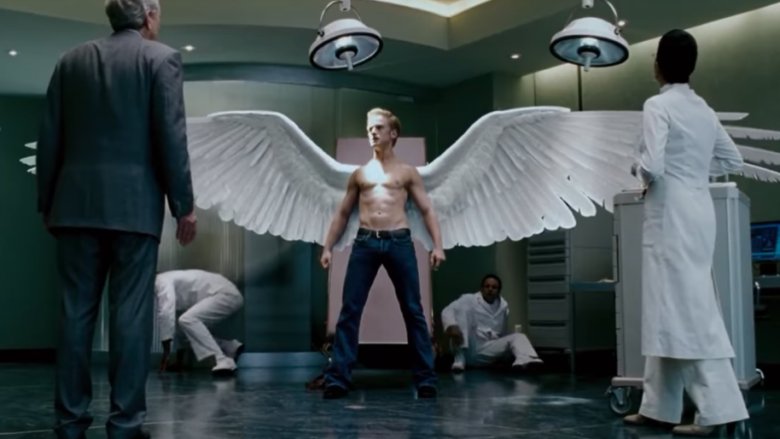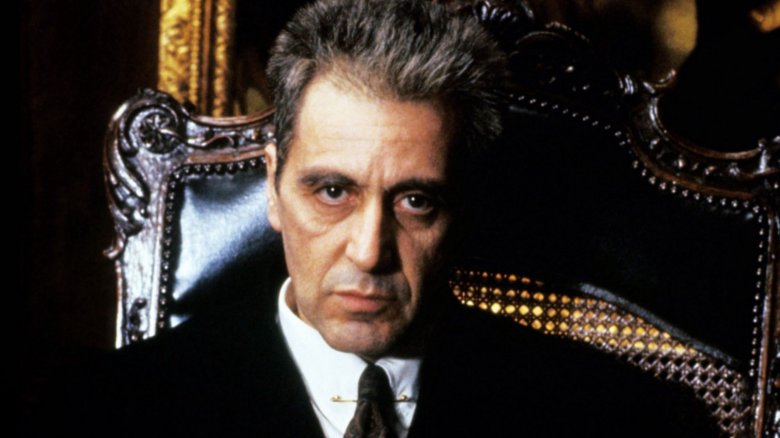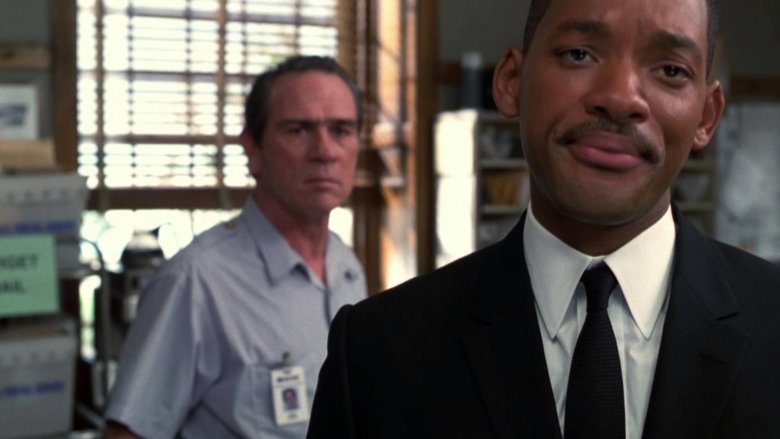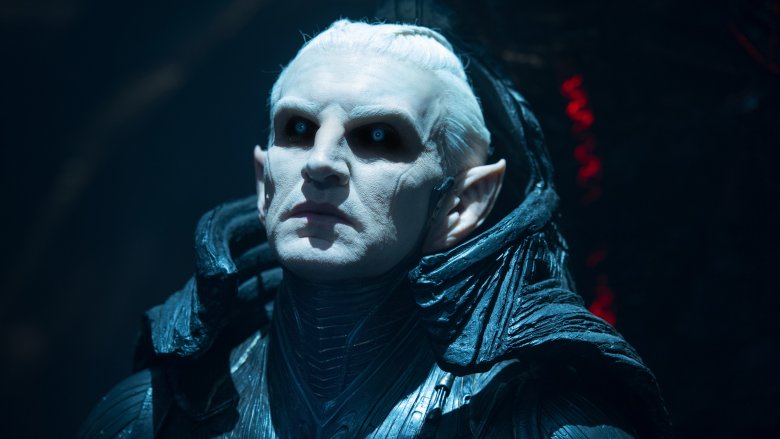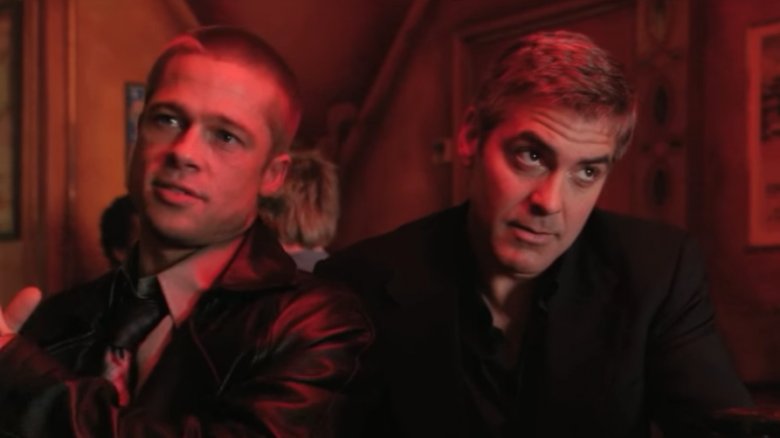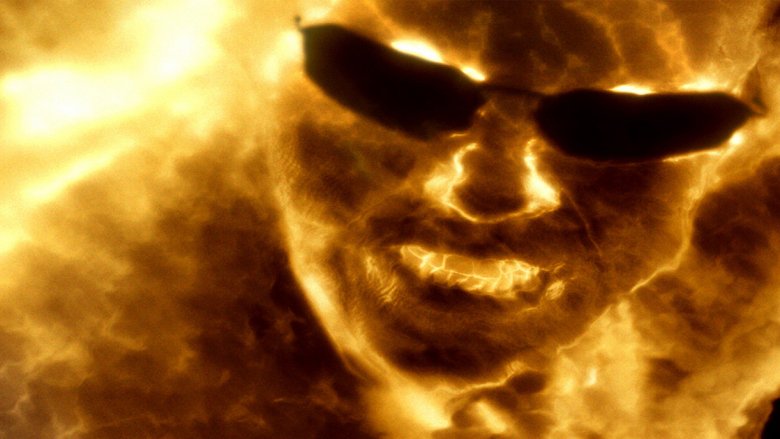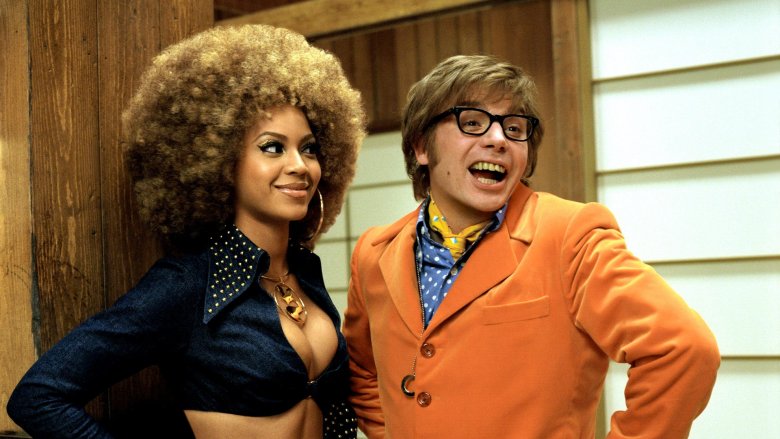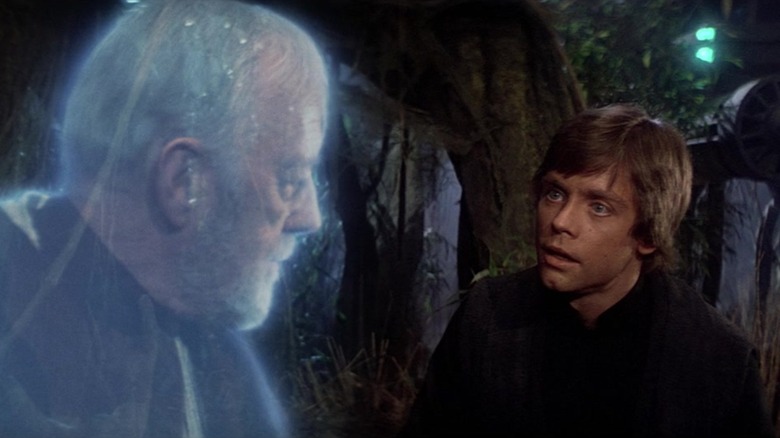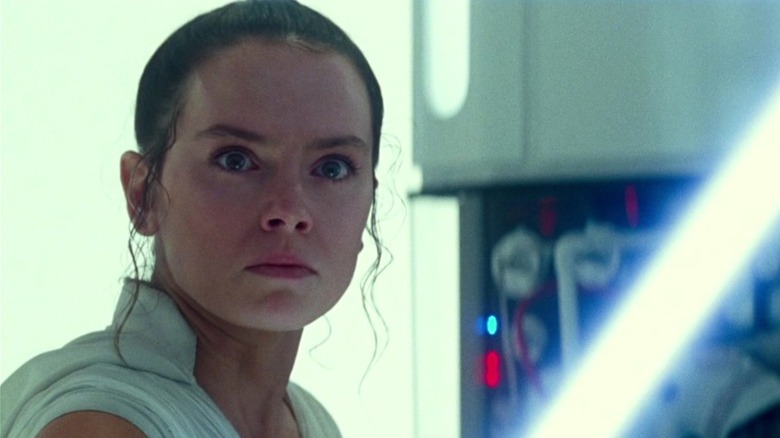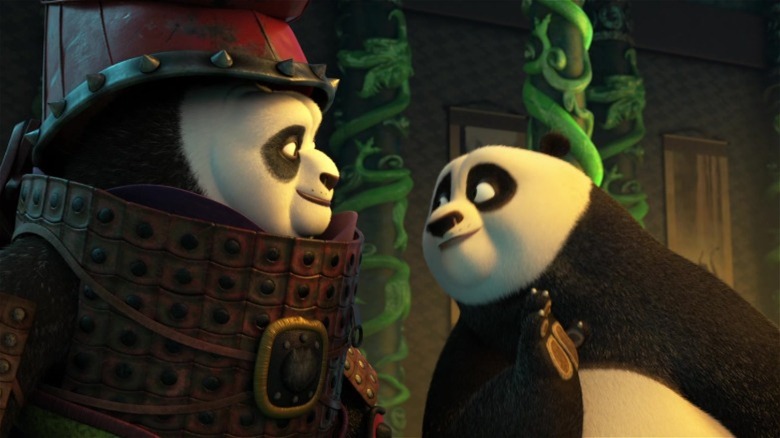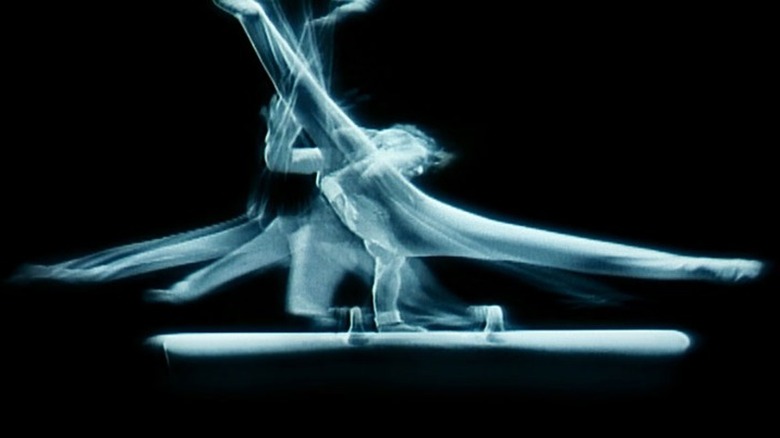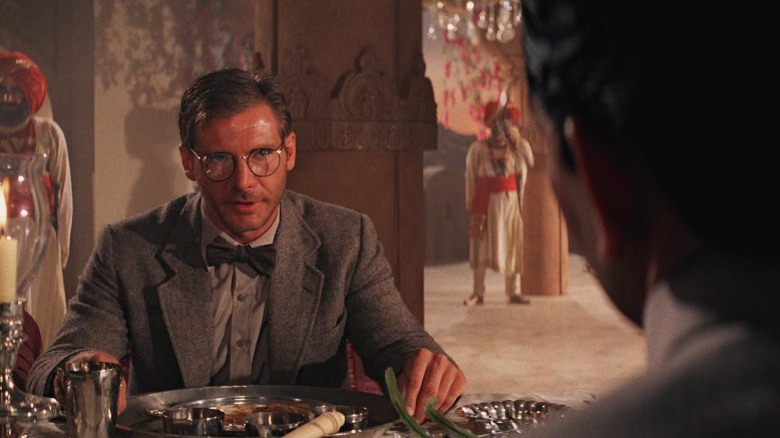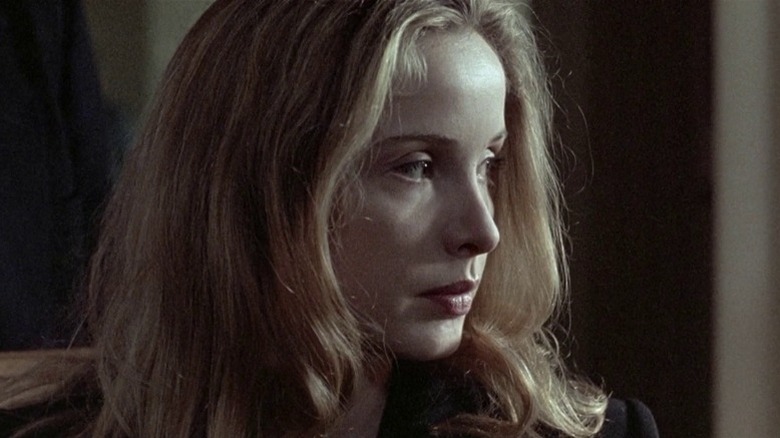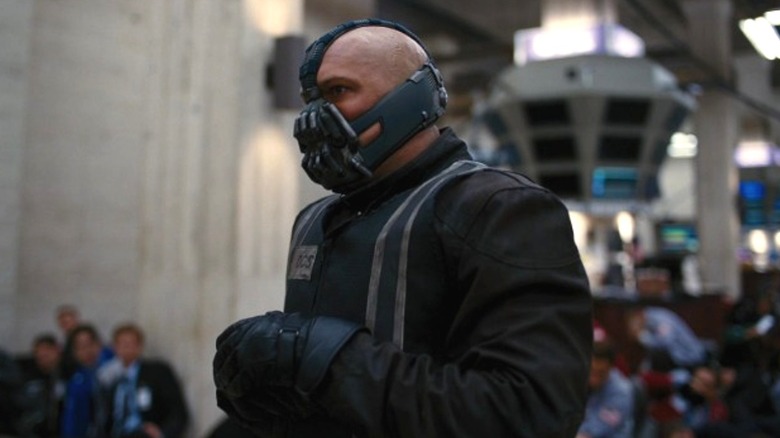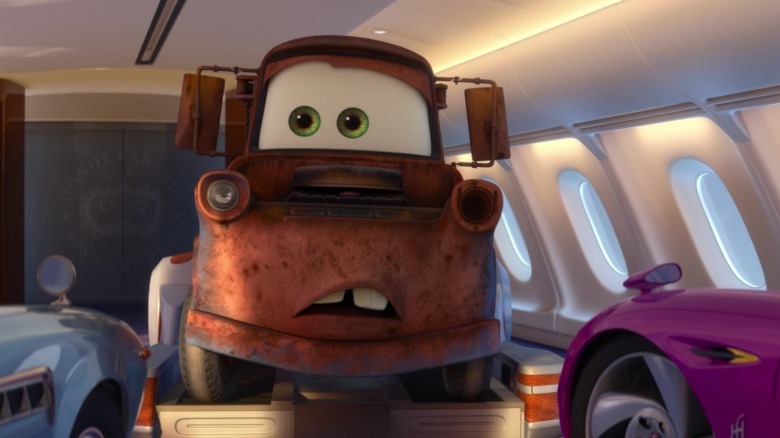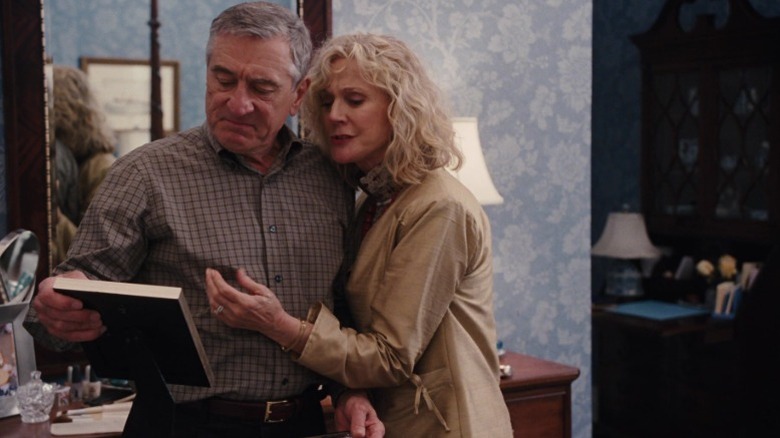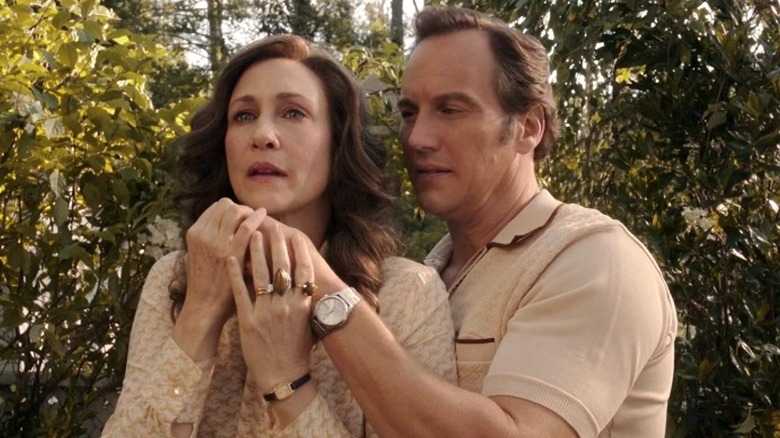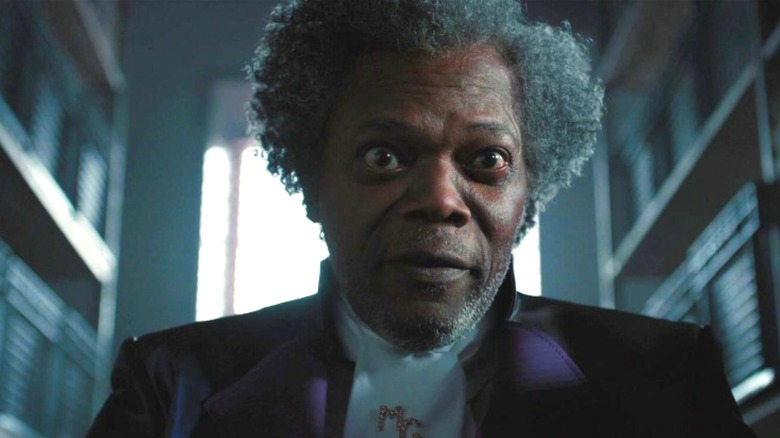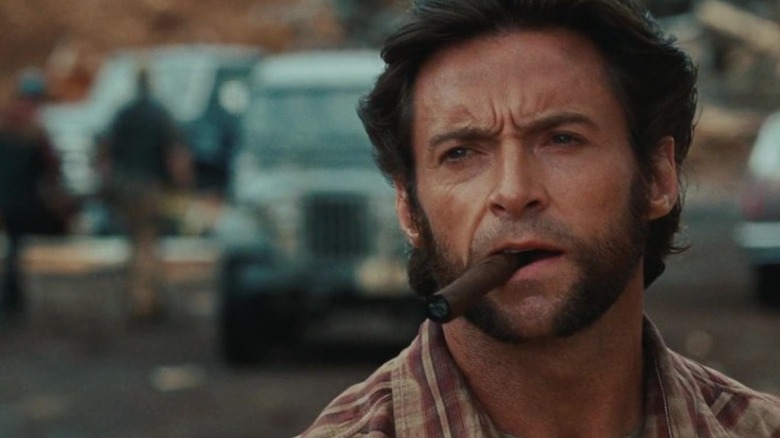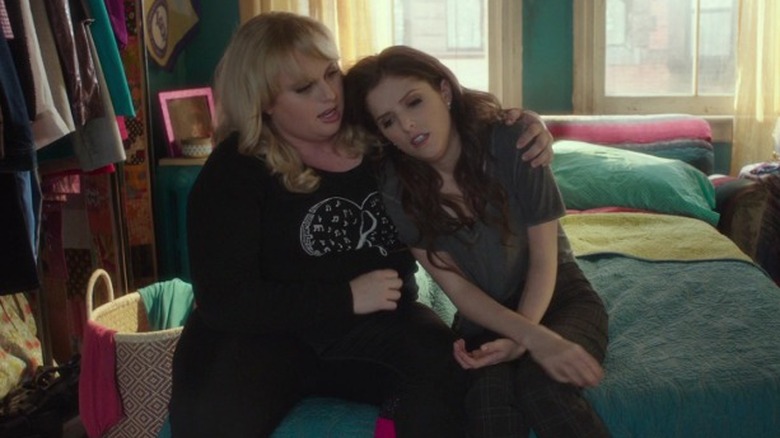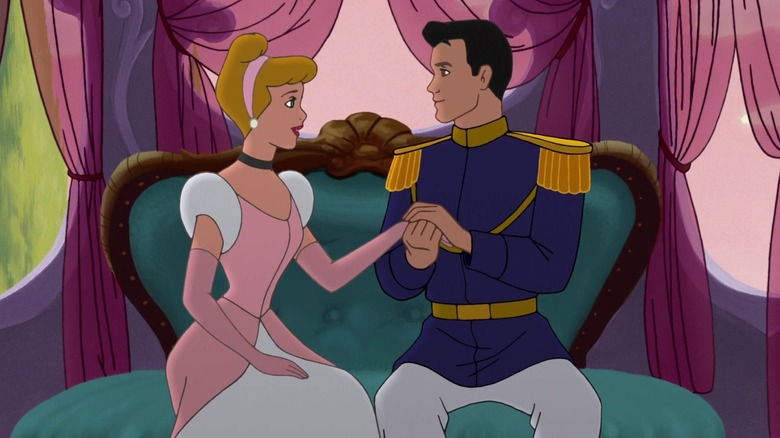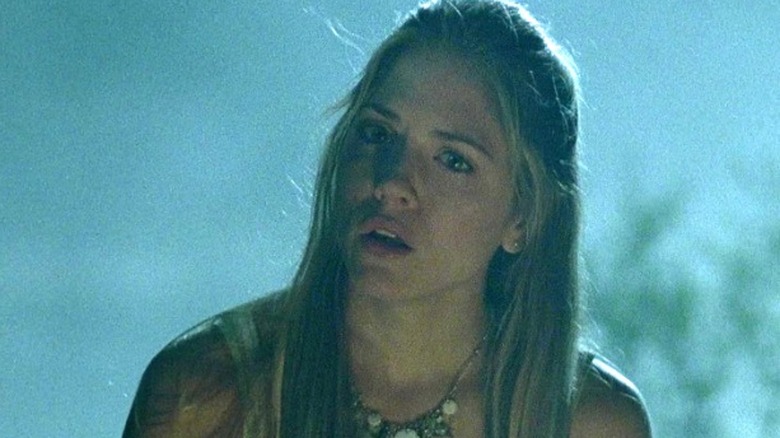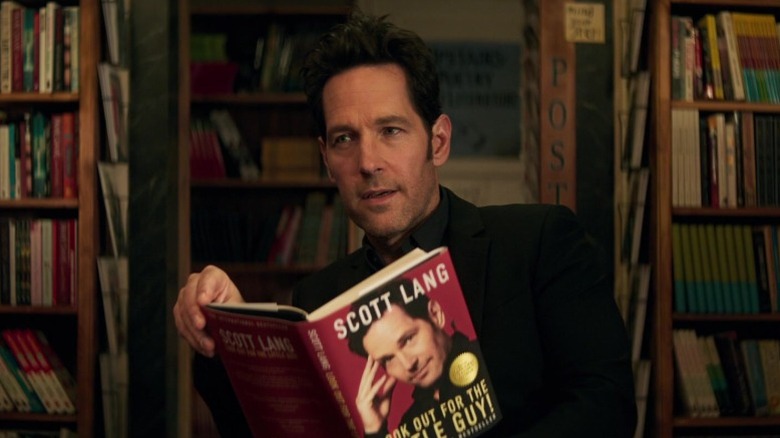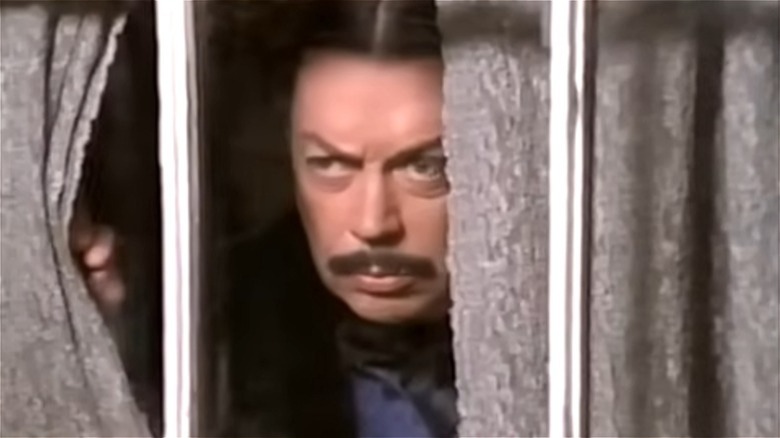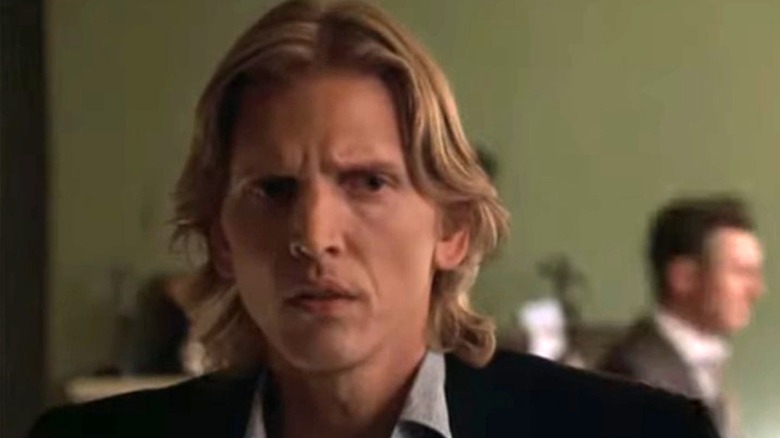Trilogies Ruined By One Movie
Truly great film trilogies are few and far between. Sure, there are standouts like "Star Wars" and "The Lord of the Rings," the original "Bourne" trilogy doesn't have a weak entry in its run, and you could make a case for "Toy Story" being the best of the lot. Past those, though, an unblemished trilogy is a shockingly rare thing. Three interconnected movies that set a precedent of quality and proceed to meet or exceed it in every entry are far more uncommon than you may realize — more often than not, at least one installment will fail to live up to the promise of the others. Plenty of franchises go straight downhill after the opening chapter; what's even worse, though, is a trilogy that's held back from perfection by a single entry. It's maddening for fans of the story being told, and more often than not, it denies fans the story structure or resolution they desire. With all that in mind, here's a look at some of the more memorable trilogies ruined by one movie.
Spider-Man (2001-2007)
It's hard to overstate the massive success of "Evil Dead" director Sam Raimi's first two "Spider-Man" films. They were crucial in creating the modern superhero boom as we know it: "Spider-Man" and "Spider-Man 2" showed modern audiences that the genre could still work in the wake of '90s bombs like "Batman & Robin" and "Steel." Watching them today, it's easy to understand why. Raimi's first two films are clear labors of love, and with the second chapter ending on a cliffhanger for the ages — Harry Osborn discovers Peter's identity, realizing his best friend is responsible for the death of his father — it seemed that the third installment was primed for a killer finale.
Unfortunately, Raimi butted heads with the studio during production, and the director was ultimately forced to include popular comics villain Venom in the story, making for a bloated and convoluted story that lacks the heart of the previous two installments. There's simply too much going on, and the campier moments are tonally jarring against the more serious elements. While a fourth installment was considered and planned, Sony ultimately decided to abandon Raimi's Spidey for a rebooted model under director Marc Webb.
Blade (1998-2004)
They may not get the respect that the X-Men and Spidey do, but the first two "Blade" films are just as integral to the modern superhero boom — the first one even laid the box office groundwork for superhero films to make their comeback with "X-Men." Blade didn't have the name recognition of everyone's favorite mutants and webslingers, and it was never a guarantee that a film featuring the Daywalker would work, yet "Blade" and "Blade II" are stellar reimaginings of the character. While directors Stephen Norrington and Guillermo del Toro deserve a great deal of credit for making the films work as well as they do, the success really comes down to star Wesley Snipes, who embodies the calm, collected cool of the character with a performance that feels effortless.
It all went wrong in the third installment, "Blade: Trinity." Set drama and a studio feud with Snipes saw writer David S. Goyer step in as a last-minute replacement director; comedian Patton Oswalt, who has a role in the film, has shared some of the horror stories from the shoot. The result is a deeply disappointing conclusion to a trilogy — and a character — that deserves better, but aside from a quickly canceled TV show, he remained off the silver screen until Snipes' returned as the hero in 2024's "Deadpool & Wolverine."
Iron Man (2008-2013)
There are few superhero origin films as perfect as 2008's "Iron Man" — the film that gave us Robert Downey Jr.'s Tony Stark, one of the all-time great pieces of movie casting.
As Stark, Downey could read the phonebook and make it fun. Still, "Iron Man 2" is something of a mess, and the only thing stopping the "Iron Man" trilogy from being one of the best of all time. It's a film clearly burdened by expectations and responsibility, almost singlehandedly tasked with taking the MCU to the next level through the introduction of Black Widow and the expansion of Nick Fury, War Machine, and Agent Coulson as characters. On top of that is an ambitious but utterly nonsensical plot involving the invention of a new element, the plans for which are hidden in the plans for the Stark Expo (it doesn't make much more sense than this sentence would lead you to believe). "Iron Man 2" didn't tank the MCU by any means, but it's early evidence that these films are far from infallible.
X-Men (2000-2006)
It's pretty standard for blockbuster films to announce their release date years in advance these days, long before a creative team has been assembled. It's been a part of the film business for a good while now and we're very much used to it. It's crucial to remember, though, that it wasn't always the case. After the first two films in the "X-Men" franchise were met with critical acclaim and great financial success, the trilogy's conclusion was slated for release before the script had been finalized. This turned out to be its downfall.
After directors Brian Singer and Matthew Vaughn both dropped out, Fox finally settled on Brett Ratner, who at that point barely had a year to make the film. Multiple cast members now had scheduling conflicts as well, leading to some strange character rewrites to account for their absences. That the film came out at all is a small miracle and certainly commendable in a certain light. However, the end product is still pretty lousy. It was such a disaster that it effectively tanked this cinematic incarnation of the X-Men until they reappeared for a brief swan song in 2014's "X-Men: Days of Future Past."
The Godfather (1972-1990)
There are few one-two punches in the history of cinema quite like "The Godfather" and "The Godfather Part II." They're perfect — possibly as perfect as movies get. It's a shame we can't say that about the series' conclusion.
Director Francis Ford Coppola set the bar so high with the first two installments of his saga that it would have been truly incredible if "The Godfather Part III" hadn't been a letdown in at least some respects, so this is one case where it's at least somewhat understandable that the film in question ended up spoiling its classic trilogy. Still, while "Part III" may not be an outright disaster, it pales in comparison to its predecessors in every way. It also bears the misfortune of containing the only notably subpar performance in the entire trilogy — and unfortunately, it comes courtesy of Coppola's daughter Sofia, a last-minute replacement for Winona Ryder in the pivotal part of Mary Corleone. The first two films are immortal. The third, decidedly less so.
Men in Black (1997-2012)
Will Smith will always be a huge star, but he was a special kind of huge star in the '90s. Any project he led was more or less guaranteed to succeed (unless that movie was "Wild Wild West" — hey, nobody's perfect). Among the biggest of his hits: 1997's "Men in Black," a stylish sci-fi action comedy that bridges the gaps between those genres with Smith's loudmouthed Agent J making a great foil for the straight and narrow Agent K, played to perfection by Tommy Lee Jones. Fifteen years later, "Men in Black III" arrived, wrapping up the story of Agents J and K perfectly — due in no small part to a killer performance by Josh Brolin as young(er) K.
Why did it take 15 years for this hit trilogy to conclude? One answer, unfortunately, is that the second film is downright lousy. "Men in Black II" feels like a recycled version of its predecessor with none of the charm or surprise. It may have been a box office hit, but it didn't exactly leave audiences hungry for more. There's no telling the heights the franchise could have reached had the second film not dropped the ball so hard.
Thor (2011-2017)
The first installment in the original "Thor" trilogy, while maybe not the best the MCU has to offer, is a solid origin story with Shakespearean flair thanks to director Kenneth Branagh. It almost feels quaint — a quiet little character study about an arrogant boy who wants to be king but isn't ready. "Thor: Ragnarok," on the other hand, is a nutty cosmic romp full of laughs and unparalleled art direction and visual design.
"Thor: The Dark World" is the black sheep of the trilogy, not so much bad as it is dull. It fails to build on the sense of wonder instilled in the first film. It feels bland and by the numbers, and it often looks like someone scribbled over the first film's bright color palette with a grey crayon. Frankly, it may have been the worst movie in the MCU at this point.
The complication comes in the fact that had it not been such a creative failure, "Ragnarok" would likely have never happened. "The Dark World" exhausts the old version of what a Thor movie should be, to the point that "Ragnarok" has no choice but to try something new. Ultimately it's a good thing that "Ragnarok" was able to happen, even if it meant enduring a pretty bland Thor movie first (and even if it means we ended up with "Thor: Love and Thunder" later). Still, it's hard not to wish the original "Thor" trilogy had maintained more consistency.
The Ocean Trilogy (2001-2006
When the right performers, script, and director align, a movie can feel effortlessly fun — just a pure pleasure to live in for a little while. Steven Soderbergh's Vegas heist film "Ocean's 11," a remake of the 1960 Rat Pack hit, is one of those movies. Featuring a killer cast that includes George Clooney, Brad Pitt, Matt Damon, Julia Roberts, and Andy Garcia, Soderbergh's "11" is so entertaining that it's almost impossible to turn away from. It's not the kind of movie you can just watch for 20 minutes when you stumble across it on cable. Its second sequel, "Ocean's 13," is similarly rewatchable, aided greatly by the inclusion of Al Pacino as the villain (and Garcia's Terry Benedict as a reluctant new addition to the crew).
"Ocean's 12," however, very nearly spoils the stew. You can't help but get the feeling when watching it that Soderbergh and company wanted an excuse to hang out in Europe and went on to tailor the film to suit their vacation needs. Everyone seems to be having a good time, but the spark present in the first and third films is gone. Throw in a genuinely bizarre subplot involving Julia Roberts' Tess masquerading as, uh, Julia Roberts and you've got a shockingly lousy film as the direct followup to one of the most entertaining movies of the century.
The Matrix (1999-2003)
"The Matrix" changed the game upon its release in 1999. Even today, the film feels like a revelation. It pushes genre boundaries, melding heady science fiction with breathtaking action shot in innovative and oft-imitated "bullet time." It gives us a cast of memorable characters and injects themes of existentialism and Buddhism into what could have been a cut-and-dry sci-fi adventure. Its sequel, "The Matrix Reloaded," doesn't quite reach the heights of its predecessor, but then again, what could? It's still a fun, interesting action romp that expands on the themes introduced in the first film.
It all comes crashing down with "The Matrix Revolutions," a bloated mess that's too long and devoid of anything meaningful or important. The transgressive themes of the franchise are cast aside for more special effects, eventually oversaturating the film — and very nearly the trilogy as a whole. It fails to deliver an ending to the "Matrix" story that its predecessors got audiences so deeply invested in. Neo's journey did eventually get a resolution, even if it wasn't completely satisfying, when "The Matrix Resurrections" arrived nearly two decades later in 2021, expanding the trilogy into a quadrilogy.
Austin Powers (1997-2002)
While he may be something of an eccentric these days, Mike Myers was a veritable comedy juggernaut in the '90s — an icon in the vein of John Belushi or Will Ferrell, an actor whose association with a project not only meant it would be successful, but that it would be funny. He hit his live-action peak with the "Austin Powers" series, a parody of the James Bond films that saw shagadelic '60s spy/playboy Austin Powers (played by Myers) frozen and then revived in modern Britain to once more protect his country from the villainous Dr. Evil (also played by Myers). It's a simple concept for a film, but Myers' comedic vigor made it a cultural phenomenon. Two sequels followed, the first being the hugely popular "Austin Powers: The Spy Who Shagged Me."
However, the trilogy's conclusion, 2003's "Austin Powers in Goldmember," sank the ship. By the time this installment arrived, the franchise's humor had lost its edge. What's more, Myers plays four characters in the movie, driving the charming multiple-performances gimmick of earlier outings into the ground. Not even a supporting performance by Beyonce could save this one. The franchise hasn't been heard from since.
Star Wars original trilogy (1977-1983)
When the first "Star Wars" was released in 1977, it immediately felt as though movies would never be the same again. New Hollywood had changed the face of American cinema, the blockbuster model was in full bloom, and, suddenly, George Lucas' enormously imaginative and engaging space opera seemed to epitomize what films were capable of in this brave, new era.
Anyone would have been excused for thinking lightning couldn't possibly strike twice — and yet, in 1980, it did. With a deeper and darker story, Irvin Kershner taking the directorial reins from Lucas, and the introduction of an all-timer of a movie character in Frank Oz's Yoda, "The Empire Strikes Back" managed to go even further than its predecessor in treading new ground for action-adventure cinema. By the time the long-awaited conclusion rolled around in 1983, "Star Wars" seemed primed to become the greatest, most epic, most perfect movie trilogy of all time.
Alas, that wasn't quite the case. While Richard Marquand's "Return of the Jedi" was by no means a disaster, it marked such a transparent shift towards safe storytelling, commercialism, loud mushy action, and tie-in-toy-centric world-building that it unintentionally went down in history as a harbinger of Hollywood's worst nascent tendencies. It's not an out-and-out bad film in the way some subsequent "Star Wars" entries would prove to be — the conclusion of Luke Skywalker (Mark Hamill) and Darth Vader's (David Prowse and James Earl Jones) story carries too much built-in pathos for that — but it single-handedly keeps the original "Star Wars" saga from being wall-to-wall masterpieces.
Star Wars sequel trilogy (2015-2019)
Funnily enough, the sequel trilogy released in the wake of the "Star Wars" revival prompted by Disney's purchase of Lucasfilm in 2012 followed a very similar path as the original, quality-wise — but with even more extreme highs and lows. First came J. J. Abrams' "Star Wars: The Force Awakens" in 2015, a rousing, solid, thoroughly satisfying nostalgia-palooza that did an excellent job of paying homage to the franchise's immense cultural imprint while establishing an engaging new set of characters and galactic circumstances.
Then, in 2017, it was followed up by Rian Johnson's "Star Wars: The Last Jedi," one of the best sci-fi adventure films of all time. This is an astounding feat of blockbuster construction that used surprise and deviation from expected paths as fuel to tell one of the most enthralling, emotionally stirring stories in the history of the "Star Wars" universe. And it did all of this while serving up editing, acting, and cinematography on a level that even "The Empire Strikes Back" didn't quite reach.
Unfortunately, though critically acclaimed and financially successful, "The Last Jedi" was raked over the coals online by a contingent of reactionary, impossible-to-please "Star Wars" fans. Even more unfortunately, Disney listened to those fans and brought back J. J. Abrams to deliver a "corrective" film that effectively negated and annulled all the emotional and narrative momentum created by "The Last Jedi" while offering bland, timid, obvious, lowest-common-denominator drivel in its stead. "The Rise of Skywalker" was so aimless and creatively bankrupt that it managed the incredible feat of pleasing no one at all.
Kung Fu Panda original trilogy (2008-2016)
Before the franchise was brought back in 2024 for a financially understandable yet creatively pointless fourth installment, with "Kung Fu Panda 4" acting as a de facto soft reboot and launching however many new sequels DreamWorks is willing to bankroll, the original saga of Po (Jack Black) and the Furious Five was told in a tight, cohesive series of three films, all produced by Melissa Cobb (replaced by Rebecca Huntley for "4").
The first "Kung Fu Panda" was pretty much an instant classic of family-friendly CGI animation. A sturdy, funny, visually gorgeous romp that struck a perfect balance between the giddy irreverence of the DreamWorks brand and the demands for seriousness, substance, and grown-up appeal of the post-Pixar American animation landscape. The second "Kung Fu Panda" was somehow even better, the rare sequel that managed to one-up a great original in almost every way while laying the groundwork for a potentially momentous third film.
That third film came in 2016, and it was ... well ... not quite as good. "Kung Fu Panda 3" still rises to a baseline level of competence and entertainment value (it's got that over "Kung Fu Panda 4," at least), but if the first two entries in the Furious Five trilogy felt like DreamWorks Animation breaking away from its own usual constraints and angling for exuberance and awe, "Kung Fu Panda 3" smacks of the studio rolling things back to the usual order of business. It marked the exact moment when this series stopped feeling special.
Qatsi (1982-2002)
One of the most incredible feats of experimentation and artistic expression in the history of American film is Godfrey Reggio's 1982 documentary "Koyaanisqatsi." Essentially a narrative-free essay film that collates masterfully captured images and sounds to paint a comprehensive, epistemologically incisive portrait of the United States of its time, "Koyaanisqatsi" is as purely hypnotic and ecstatic as any movie ever made — a feat of imagination and technique that finds Reggio bringing back the spirit of early avant-garde film masters like Dziga Vertov and Alexander Dovzhenko.
It was followed in 1988 by "Powaqqatsi," a sequel that took the same kaleidoscopic, free-flowing approach to a chronicle of modern life in the Global South, yielding similarly entrancing results. While not as famous as "Koyaanisqatsi," it's pretty much just as accomplished.
The same cannot be said, however, for the series' belated third installment, "Naqoyqatsi," which was released in 2002. On paper, it was a commendable project; whereas the previous two "Qatsi" films were made up of original, carefully edited footage, "Naqoyqatsi" largely amounts to stock footage that's been transformed through digital processing to put forth a reflection on the increasing centrality of technology and the virtual world. In practice, however, the results were utterly substandard. Running through swaths of unimpressive imagery and crude, low-budget early CGI with little in the way of a cohesive thesis, "Naqoyqatsi" stands as a time capsule in the worst possible way. Rather than a sweeping and visionary summation of a specific historical era like "Koyaanisqatsi," it's the kind of bad idea that could only have seemed like a winning one in the early 2000s.
Indiana Jones original trilogy (1981-1989)
There are few tentpole films out there as flawless as Steven Spielberg's "Raiders of the Lost Ark," a work of pop culture galvanization so successful that it managed to turn Harrison Ford's Indiana Jones — a wholly original character, mind you — into the kind of enduring global icon that feels like he's always been around. For all intents and purposes, "Raiders" was the film that ushered in the '80s, and so it was appropriate that the original run of "Indiana Jones" movies should extend all the way from 1981 to 1989 when it concluded with the sprightly and utterly joyous "Indiana Jones and the Last Crusade."
But even though the "Indiana Jones" original trilogy is bookended by two great installments, the same cannot be said for the middle chapter. In fact, 1984's "Indiana Jones and the Temple of Doom" is decidedly substandard for a wide array of reasons.
Those reasons begin, of course, with the film's — let's not mince words — immensely racist depiction of India, hand-waved as an "homage" to the also frequently racist adventure serials the film takes after, yet no less grueling to endure. On top of that, the screenplay — by Willard Huyck and Gloria Katz, taking over from Lawrence Kasdan — leans a little too heavily on comedy without actually being very funny. On top of that, "Temple of Doom" is the only "Indiana Jones" movie that is so enamored with its own elaborate action set pieces as to neglect thoughtful storytelling. The mine cart chase is, admittedly, pretty nifty, for what that's worth.
Three Colours (1993-1994)
Through his austere, deeply felt, and highly intellectual and experimental productions for movie theaters and television alike, Polish director Krzysztof Kieślowski is often credited with essentially inventing the contemporary European arthouse film. Many would argue that the highest point of Kieślowski's career is the "Three Colours" trilogy, a French-Polish-Swiss international co-production that explores the French Revolution ideals of liberté, egalité, fraternité — liberty, equality, fraternity — through acrid and ironic yet profoundly poetic means.
Indeed, 1993's "Three Colours: Blue," which examines the concept of liberty through the story of a woman (Juliette Binoche) isolated by all-consuming grief, is one of the most emotionally affecting films ever made. And 1994's "Three Colours: Red," a kaleidoscopic fraternity-themed drama about a model (Irène Jacob) unraveling a complex human tapestry, is even greater — a searching, dizzyingly creative work of genius.
Given the level of achievement we're talking about, "ruined" feels like almost too harsh a word for 1993's "Three Colours: White," which commits the mere crime of merely being "pretty good" next to two transcendent masterpieces. More's the pity; "White," with its farcical plot of a man (Zbigniew Zamachowski) going on a revenge quest after his erectile dysfunction prompts his wife (Julie Delpy) to divorce him and causes him to lose everything, is the only thing pulling the "Three Colors" trilogy back down to Earth level. It feels too silly to be entirely credible as a drama, yet it isn't funny enough to work as a comedy — though, to be clear, Kieślowski's sheer virtuosity as a filmmaker still makes it a compelling watch.
The Dark Knight trilogy (2005-2012)
When Christopher Nolan took the reins of the "Batman" film franchise, it was a watershed moment for superhero films and for Hollywood as a whole. Through his serious, sober, dramatically grandiose, psychologically exacting approach to the Bruce Wayne mythos in 2005's "Batman Begins," Nolan showed the world a new vision of what comic book adaptations could be, ushering in a whole new era of (seldom equally successful) grounded and "realistic" superhero movies.
Before anyone had the chance to do him one better, Nolan himself repeated the feat with 2008's "The Dark Knight," which went down as an instant classic. Its no-holds-barred plunge into the moral and philosophical conflict between Batman (Christian Bale) and the Joker (Heath Ledger) balanced out some of the most gorgeous, exciting, painstakingly crafted superhero action in the genre's history.
Then came 2012's "The Dark Knight Rises," and, well ... the party wasn't exactly ruined, but it sure lost some of its luster. Despite the director's typical panache on the technical front and valiant efforts from committed cast additions Tom Hardy and Anne Hathaway, "The Dark Knight Rises" was everything its two predecessors so studiously avoided being — bloated, ponderous, grim to the point of goofy, disastrously ham-fisted in its political commentary, and just not very fun to watch. You could excuse Nolan for allowing himself a 164-minute runtime following the generational success of "The Dark Knight," but he filled those 164 minutes with in absentia reminders of key components to that success: precision, tightness, and clarity of purpose.
Cars (2006-2017)
2006's "Cars" was a thoroughly charming, visually dashing, tonally graceful, and legitimately funny little slice of whimsical family-oriented storytelling. It was, in a sense, the only early-period Pixar movie that wasn't trying to reinvent the wheel (rather ironic, given that it certainly featured more wheels than every previous Pixar movie combined), instead settling for taking a solid formula and acing its cozily familiar components.
2017's "Cars 3," the de facto sequel to "Cars" — as in, the one that picked up where the first left off and continued its story and themes — was somehow, against basically everybody's expectations, an even better movie. The 11 years of temporal distance did wonders for the poignancy and resonance of the franchise's ongoing tale of fame, nostalgia, obsolescence, and shifting legacies. Watching Lightning McQueen (Owen Wilson) pass the torch to Cruz Ramirez (Cristela Alonzo), the thought of another, unrelated "Cars" sequel having existed at some point felt almost like a distant dream.
Unfortunately, it wasn't a dream. A thoroughly misguided spy thriller pastiche that bet an unjustifiable amount of its success on the would-be charisma of Larry the Cable Guy's Mater, "Cars 2" is widely remembered — or, more accurately, widely not remembered — as the movie that broke Pixar's incredible winning streak, proving the studio was just as capable as its competition of delivering the occasional turkey. It says something that, even succeeding "Cars" — by some distance the least acclaimed Pixar movie prior to 2011 — and thus not having much of a brand reputation to upend, "Cars 2" still managed to embarrass its predecessor.
Meet the Parents (2000-2010)
Jay Roach's 2000 film "Meet the Parents" is the rare example of a remake that's so successful and memorable that it managed to all but eclipse the original; few people nowadays even know that it's a reimagining of an eponymous 1992 indie. Elevating cringe comedy to high art, the film went down as one of the most unlikely success stories of early-2000s cinema. A mean, strange, venomous family comedy mostly consisting of people being horrible to each other and failing to get along that somehow, by the sheer strength of its laughs and cast, became a global box office hit.
A sequel was inevitable, and it came, in 2004, in the form of "Meet the Fockers," which inverted the premise by having Pam (Teri Polo) meet Greg's (Ben Stiller) parents. Thanks to a similarly strong sense of humor and the adroit casting of Dustin Hoffman and Barbra Streisand to spar with Robert De Niro and Blythe Danner, "Meet the Fockers" proved improbably strong for a mandatory hit studio comedy sequel.
"Little Fockers," the 2010 trilogy closer, meanwhile, made a pretty definitive case for this particular franchise no longer having any gas in the tank. In attempting to wring something, anything, out of a premise that only really allowed for two possible iterations — this time Greg and Pam have kids, or whatever — "Little Fockers" proved that even the best cast in the world can't save a script utterly devoid of laughs, ideas, or creative reasons for existing other than "the first two were hits."
The Conjuring (2013-2021)
The first two "The Conjuring" films saw James Wan channel his considerable skills as a filmmaker into one clear, singular goal: scaring the living daylights out of people. Yoked to a tried-and-true ghost flick formula and buoyed by classicist, elegant, crowd-pleasing direction, 2013's "The Conjuring" acted as a kind of blockbuster ideal of what a horror movie could be, layering tension on top of tension and scares on top of scares with a finesse seldom equaled in the medium's history. 2016's "The Conjuring 2" fared just as well in undertaking the same straight-to-the-point mission, again raking in enormous amounts of dough by turning multiplexes into de facto amusement park haunted mansions.
But as soon as James Wan left the director's chair, it was obvious that "The Conjuring" movies were just not quite as enticing a proposition without his immense scaremongering skills behind the camera. Directed by Michael Chaves (whose only other credits as a director are two spin-offs based in the "Conjuring" universe), 2021's "The Conjuring: The Devil Made Me Do It" revamps the franchise by eschewing the haunted house template and placing Lorraine (Vera Farmiga) and Ed Warren (Patrick Wilson) into a kind of ghost procedural — but something gets lost in the shuffle. The movie features less beautiful visuals, more nonsensical plotting, and considerably more dragged-out pacing than its two predecessors, yet its real crime is that — apart from one or two nifty sequences here and there — it's just not terribly scary. Relentlessly intense, crowd-pleasing horror movies, it turns out, are not that easy to pull off.
Unbreakable trilogy (2000-2019)
M. Night Shyamalan's "Unbreakable" would be a worthy contender for the title of best original superhero movie of all time. Taut, propulsive, deeply emotional, and thematically ambitious, Shyamalan's film about an ordinary man (Bruce Willis) who finds out he may have superhuman invulnerability and strength boasts all the imaginative expansiveness and moral rigor of the best films in the genre, while carrying itself with an earnest, melancholy attitude that's distinctly Shyamalanian.
After disappointing audiences with his subsequent projects following "Unbreakable," 2016's "Split" marked Shyamalan's return to the public's good graces, and for good reason. It was a gripping, irresistibly watchable horror-thriller that found blockbuster thrills in the minimalist story of three girls trapped in an unstable man's (James McAvoy) basement. At the end of "Split," there was a twist: it was a sequel to "Unbreakable," as well as the official jumping-off point for an eventual follow-up that would conclude a trilogy. The moment of realization that both movies were connected made for one of the biggest adrenaline rushes provided by any movie in the 2010s.
Less exciting was the follow-up itself, 2019's "Glass," which brought the characters from "Unbreakable" and "Split" together in a busy, messy, and disappointingly momentum-free thriller. It was one of those cases of the lead-up to a thing being orders of magnitude more engaging and pleasurable than the thing itself. Much of the narrative handiwork was devoted to just making "Unbreakable" and "Split" function as parts of the same universe, leaving little room for "Glass" to be its own, equally compelling thing.
Wolverine trilogy (2009-2017)
It's not often that a movie trilogy manages to get better with every installment; it's even rarer for one to right itself and find the yellow brick road to success after starting out with a massive dud. But that's just what happened with Fox's three solo "Wolverine" films. 2009's "X-Men Origins: Wolverine" did not amount to much, but, with James Mangold stepping in as director, 2013's "The Wolverine" found just the right groove to handle the X-Man (Hugh Jackman) as an individual character. It upended expectations by showing that a mostly self-contained story about Marvel's most popular mutant could work exceedingly well if given the right tonal balance and thematic emphasis.
Then, in 2017, "Logan" took that newfound knowledge and just absolutely ran with it. In a testament to the thoughtfulness and emotional heft of its melancholy, post-apocalyptic storytelling, "Logan" ultimately went down in history as the first live-action superhero film ever to be nominated for a screenwriting Academy Award.
That achievement seems downright miraculous considering how things started off. "X-Men Origins: Wolverine" wasn't just a poor cinematic transposition of the X-Man's mythos that fundamentally misapprehended both him and several other Marvel characters (including an utterly humorless Ryan Reynolds-played Deadpool). It was a downright disastrous film, lacking momentum or depth or originality or appeal of any kind. Somehow, it managed the wondrous feat of making it look like a Wolverine-centric movie couldn't possibly work. In hindsight, that's a hilarious thought to have ever had, but that's just how bad this movie was.
Pitch Perfect (2012-2017)
There was something irresistibly daffy about "Pitch Perfect," a 2012 Universal Pictures production that seemingly came out of nowhere to revitalize the campus comedy and make it make sense for a new era. The Kay Cannon-scripted, Jason Moore-directed film pulled that feat off by diving headfirst into the cutthroat world of competitive a cappella singing, using its boisterous joy, impressive complexity, and unapologetic sense of theater-kid corniness to tell a satisfying story about teamwork, friendship, and the value of defying tradition.
It became the kind of once-in-a-blue-moon box office hit that even managed to get a song into the Billboard Hot 100, and, sure enough, the magic continued with the 2015 sequel "Pitch Perfect 2." Helmed by actress and producer Elizabeth Banks in her feature directorial debut, the franchise's second movie managed to keep up almost everything great about the first installment while genuinely deepening the series' emotional pull.
Sadly, this high note could only be held for so long, and "Pitch Perfect 3" was the moment when the franchise stopped knowing what to do with itself. Its one-last-hurrah story about the Barden Bellas reuniting two years after graduating from college was a good idea on paper, but it was executed with a degree of awkwardness not dissimilar to the disastrous stage performance that opens the first film. It felt like a movie that didn't have a persuasive reason for existing other than the need to rake in more cash, which just fundamentally clashes with the ethos of a film series so thoroughly based around sincerity and earnestness.
Disney's Cinderella trilogy (1950-2007)
The concept of counting a batch of the cheaply made direct-to-video Disney sequels released in the '90s and '2000s as constitutive of a "trilogy" may seem like a bit of a stretch for the unfamiliar, but mind you, in the case of the "Cinderella" movies, it's warranted. The original 1950 film is, of course, a classic, featuring some of Disney's most beautiful animation and a pervasive sense of whimsy and wonder perfectly counterbalanced by a hefty dose of old-school fairytale viciousness. And, against all odds, 2007's "Cinderella III: A Twist in Time" is the film that single-handedly proves Disney's subsidiary department of bang-for-your-buck home video brand extensions wasn't entirely artistically pointless. It is a genuinely very good movie, one that riffs cleverly and imaginatively on the "Cinderella" tale by way of an utterly absurd yet surprisingly well-done time travel plot; on a writing level, it genuinely cuts deeper and goes further than even the first "Cinderella."
2002's "Cinderella II: Dreams Come True," meanwhile, is ... well ... exactly the usual thing you'd expect of a Disney direct-to-video sequel. In fact, it manages to be even more unglamorous and lifeless than usual, a collection of slapped-together where-are-they-now tales, none of them particularly engaging. The whole thing just reeks suspiciously of a would-be TV series belatedly retrofitted into a movie release, and, like most of the numbered stuff you could find in the Disney aisle of a DVD store in the mid-2000s, it has no appeal for anyone over the age of 10.
I Know What You Did Last Summer (1997-2006)
Speaking of underwhelming direct-to-video sequels, anyone who was a teenager in 1997 remembers what a phenomenon the first "I Know What You Did Last Summer" was. With its guilt- and paranoia-tinged story of four friends contending with the apocalyptic weight of their own past actions, it played a major part in the '90s slasher revival, finding a new straightforward path for the genre away from the inimitable meta antics of "Scream." It wasn't exactly high art, but, as a multiplex-friendly horror-thriller starring all the most iconic young faces of '90s cinema, it did just what it was supposed to do — one of those things, of course, being the prompting of a sequel.
Released just the following year, "I Still Know What You Did Last Summer" was not quite up to the same standard as its predecessor, but it was still a solid, entertaining, satisfyingly spooky romp with iconic '90s cheese to spare. Perfect viewing for a sleepover, if you will, even all these years later.
Even if you grew up with the "I Know What You Did Last Summer" movies, however, there's a non-negligible chance that you haven't even heard of "I'll Always Know What You Did Last Summer," a 2006 DVD-bound standalone sequel that effectively closes out the original trilogy. With visibly cheap production values, no returning actors or characters, indifferent writing and direction, and approximately zero scares, it's a movie too bad and dull to even enjoy in the company of friends at 1 A.M.
Ant-Man (2015-2023)
Of all the gambles made by the Marvel Cinematic Universe during the inordinately successful "Infinity Saga" run of 2008-2019, none were gutsier — or more indicative of the franchise's enormous success and cultural sway — than betting on Ant-Man as a viable standalone anchor film. But, in 2015, Peyton Reed's "Ant-Man" proved that even a relatively little-known and tonally goofier character could climb to a $500 million box office intake with the MCU's backing.
It helped, of course, that the movie was incredibly fun — a pure, lighthearted comedy that didn't play coy about the stretchy and cartoony potential of its own sci-fi hook while still finding room to be plenty sturdy and exciting as an action blockbuster. 2018's "Ant-Man and the Wasp" was nearly as much of a blast, even if it was ever-so-slightly bogged down by an increasing overabundance of franchise lore. At the end of the day, what really mattered was that Reed always knew to return to the simple, dazzling pleasure of playing with scale.
In 2023's "Ant-Man and the Wasp: Quantumania," however, the "Ant-Man" franchise finally found itself buckling under the weight of brand obligations. Where the previous two movies were crisp, focused, self-effacing, and always entertaining in the moment, the series' first entry within the "Multiverse Saga" is bloated, tonally chaotic, visually dour, and constantly mired in joyless exposition and franchise table setting. To say it barely feels like an "Ant-Man" movie would be an understatement; in its grayest, mushiest, most transparently corporate-mandated moments, "Quantumania" barely feels like a movie, period.
The Addams Family (1991-1998)
Technically speaking, Paramount Pictures' "The Addams Family" is a duology — and a fantastic one at that. Respectively released in 1991 and 1993, the Barry Sonnenfeld-directed "The Addams Family" and "Addams Family Values" were platonic examples of an old creative property being lovingly and shrewdly revitalized for a new era. Not only did they capture the spirit of the Charles Addams-created cartoon characters and their '60s TV counterparts to a T, complete with some of the most miraculously perfect casting in movie history (seriously, who came up with the idea for Anjelica Huston and Raul Julia as Morticia and Gomez?), but they also worked incredibly well as crowd-pleasing black comedies even for those completely unfamiliar with the franchise. Their success revitalized interest in the Addams Family in a whole generation, and the series could easily have gotten up to three or more installments within the same canonical continuity — but Raul Julia's death in 1994 made that idea all but unviable.
Instead, what we got was 1998's "Addams Family Reunion," a direct-to-video Saban Entertainment production that functioned as a pilot for the short-lived YTV/Fox Family series "The New Addams Family." Starring Daryl Hannah as Morticia and Tim Curry as Gomez, "Addams Family Reunion" carries over none of the wit, charm, satirical edge, or delectable darkness of the first two live-action "Addams Family" films, instead opting to train its focus entirely on kid viewers while awkwardly negotiating the ever-hovering legacy of Sonnenfeld's films. There is no need for any "Addams Family" fan to watch it.
Ripley trilogy (1999-2005)
The three cinematic adaptations of Patricia Highsmith's "Tom Ripley" novels released at the turn of the 21st century — 1999's "The Talented Mr. Ripley," 2002's "Ripley's Game," and 2005's "Ripley Under Ground" — make up an unofficial trilogy that refracts the character and Highsmith's voice through an intriguingly multifaceted cinematic prism. Each one is produced by a different studio, helmed by a different director, and stars a different actor as murderous con artist Tom Ripley, but what they add up to is a testament to the enduring power of Highsmith's creation.
The 1999 film, directed by Anthony Minghella and starring Matt Damon, is, of course, the most famous of the three — a veritable modern classic that paints gorgeous seaside Italian vistas with the colors of dread and paranoia. The 2002 film, meanwhile, offers a different flavor of Ripley yet proves to be just as strong in its own way, with the formidable team-up of director Liliana Cavani and star John Malkovich leading viewers down even more stylish and psychologically complex waters.
"Ripley Under Ground," though, is just bad. Roger Spottiswoode — best known as the director of "Turner & Hooch" and "Tomorrow Never Dies" — is an utter creative mismatch for this particular project, and Barry Pepper doesn't feel much more at home in the role of Tom Ripley. The movie often feels as though it wants to fit a square peg in a round hole, refashioning Highsmith's delightfully perverse and patient studies of a psychopath's mind into hokey action thriller fodder, tacky mid-2000s editing and all.
